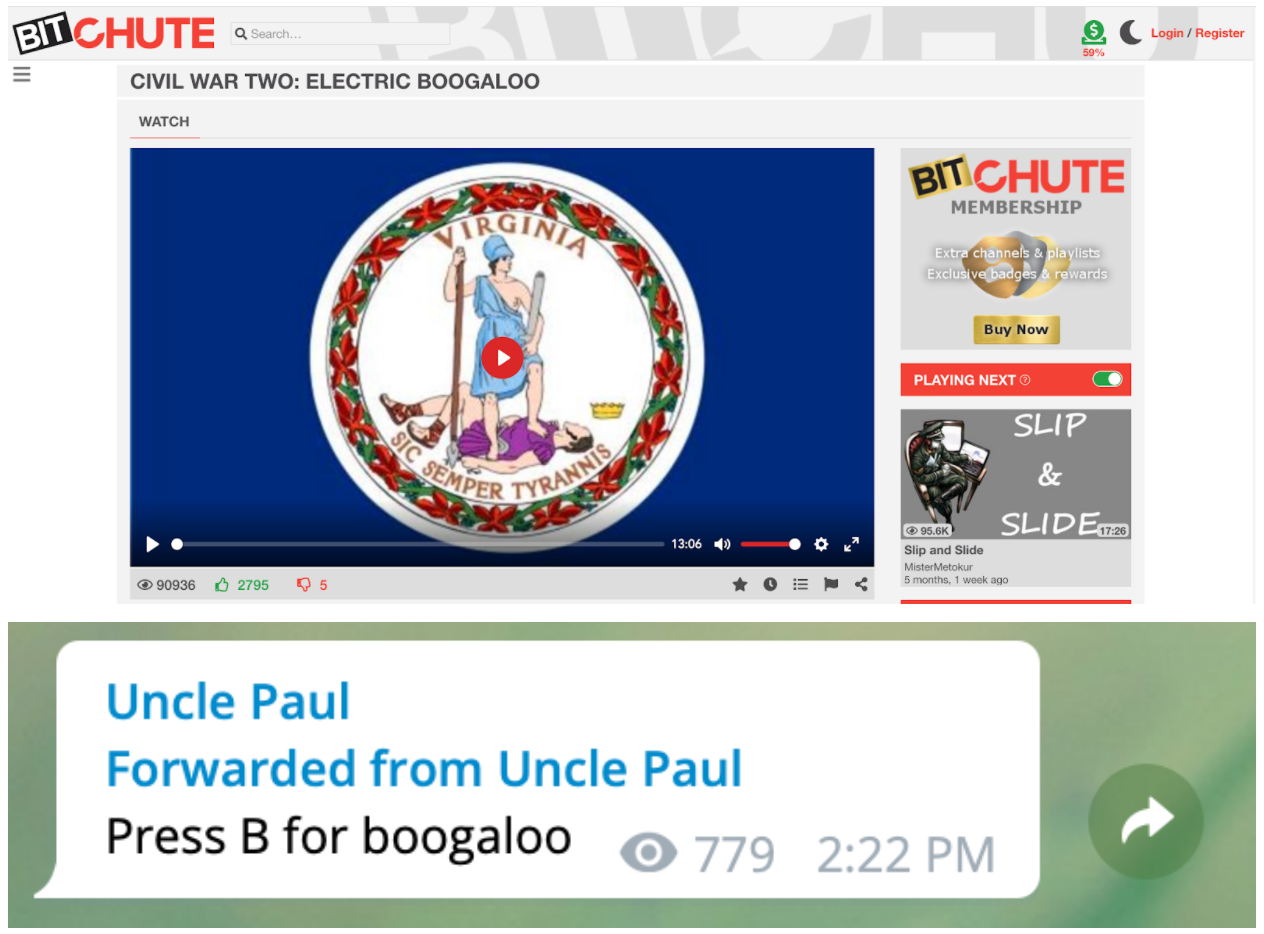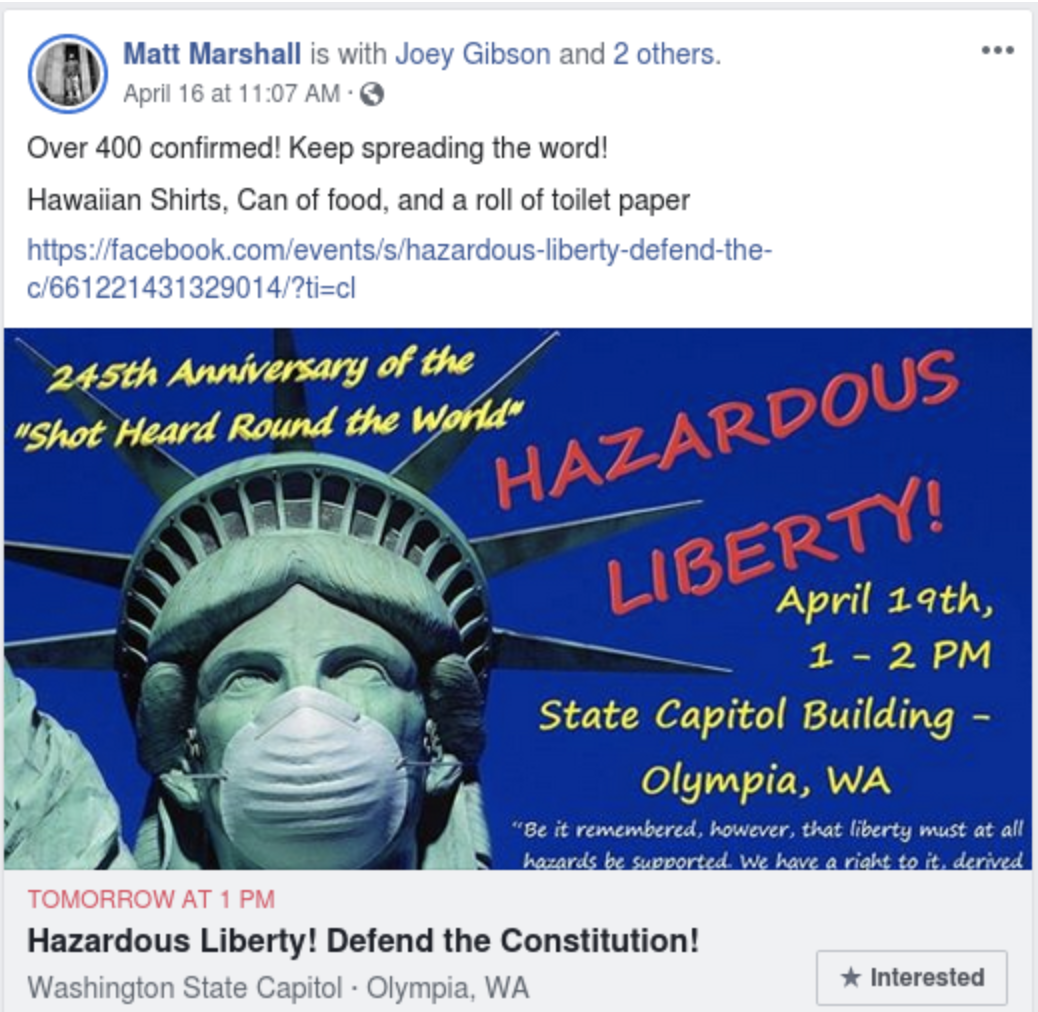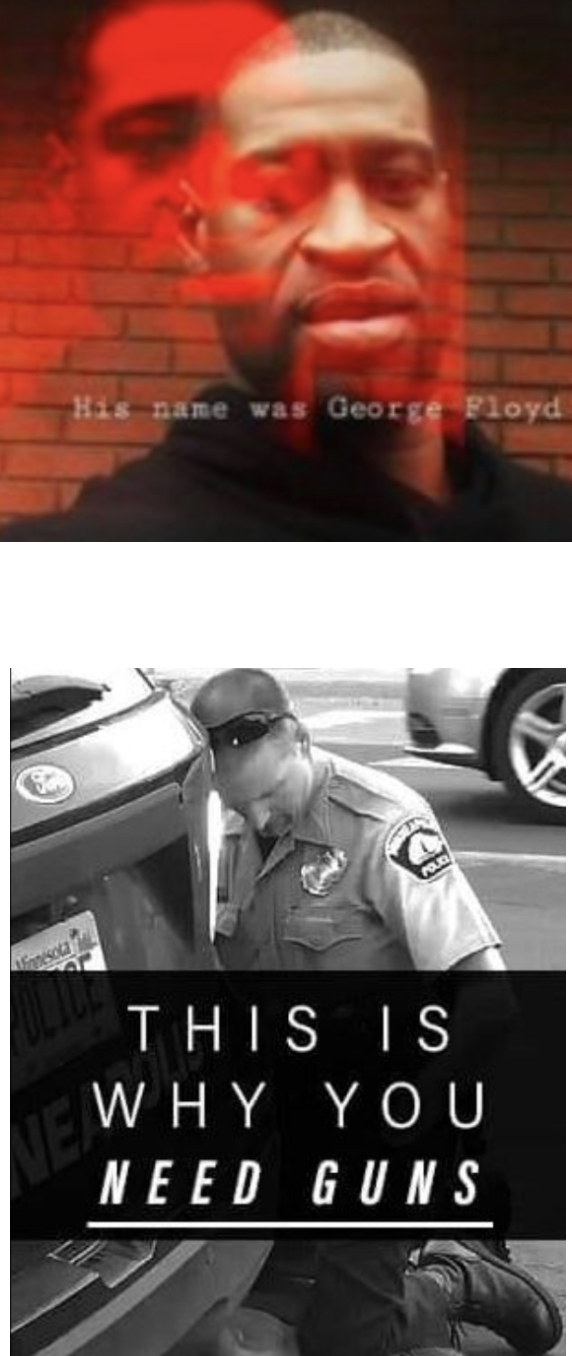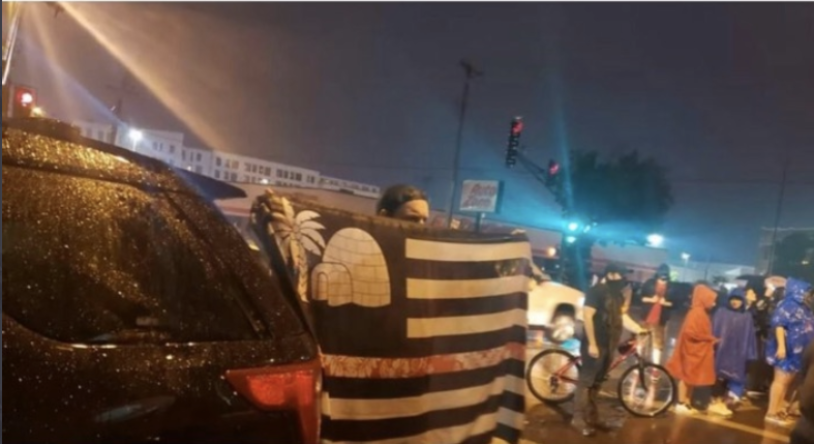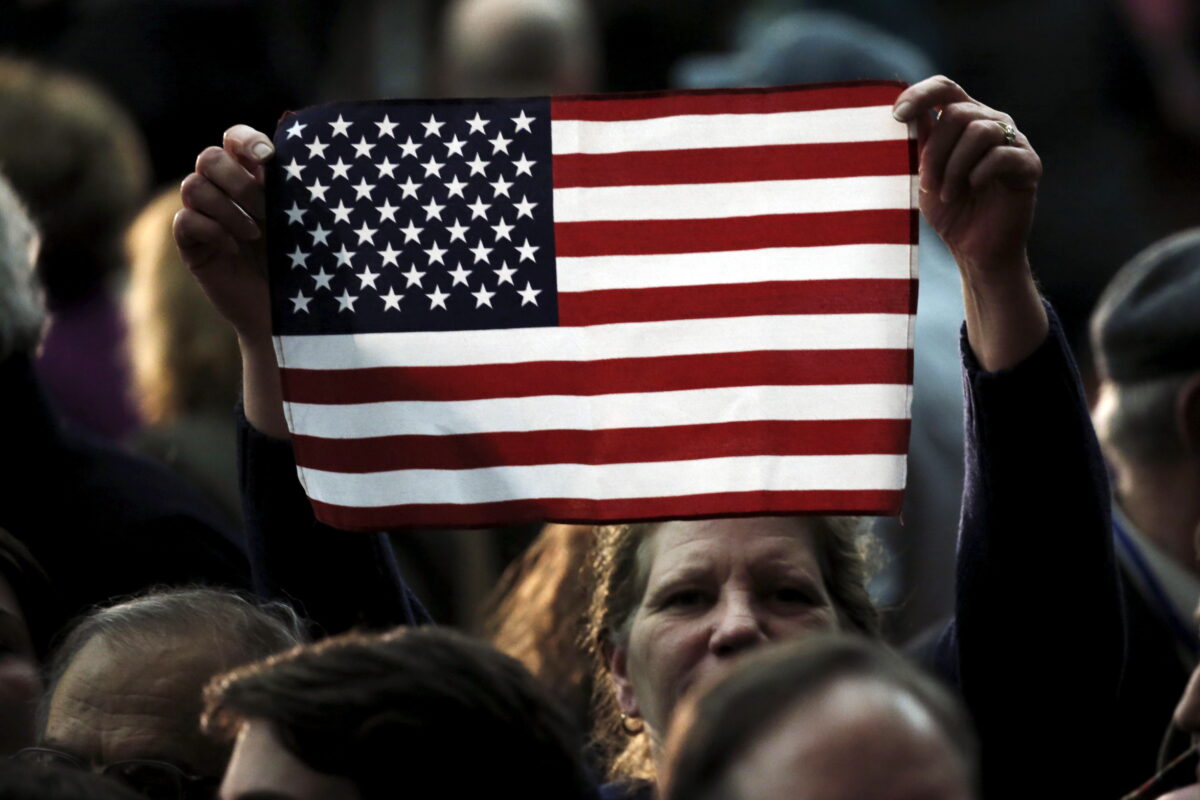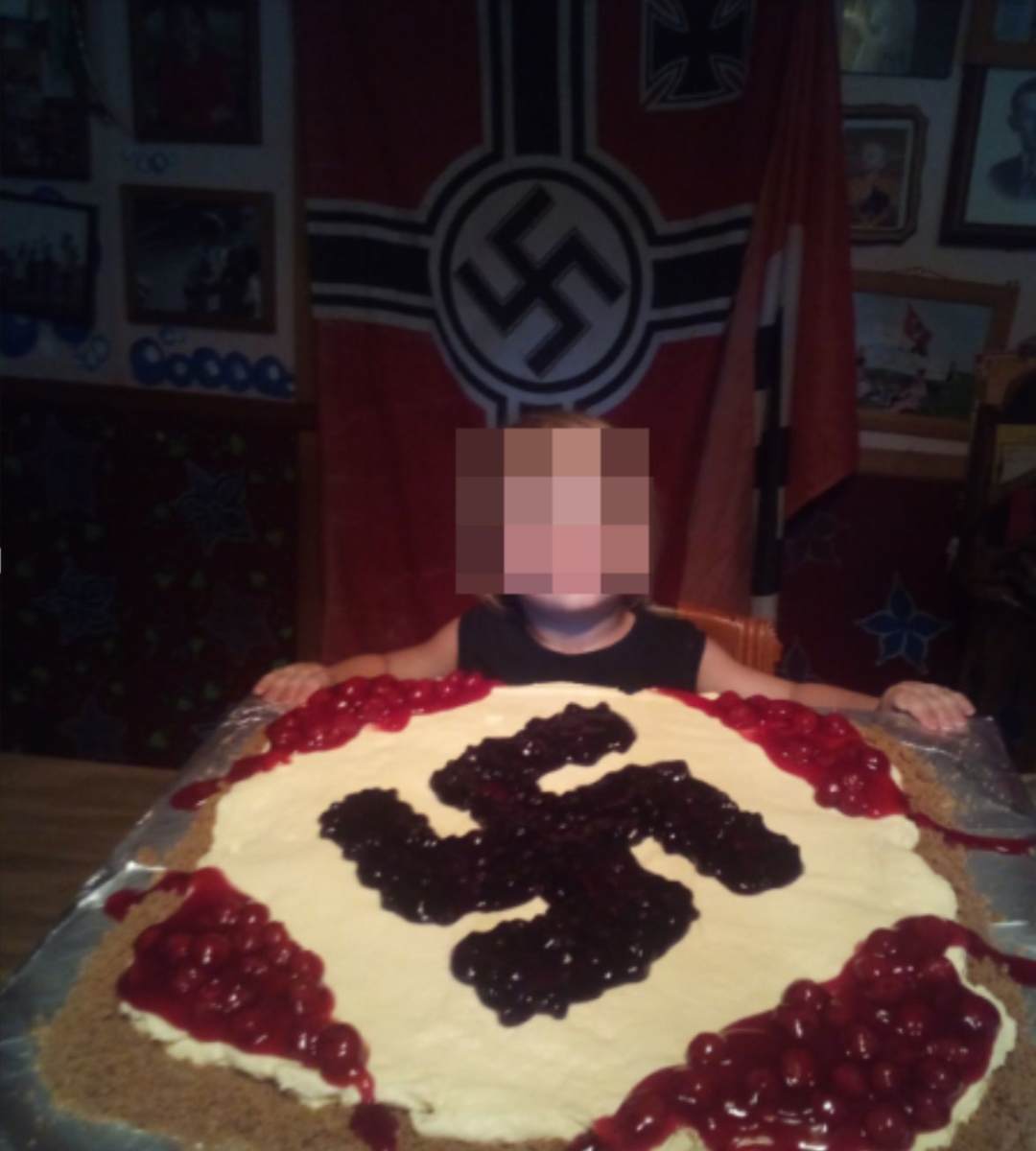The Boogaloo Movement Is Not What You Think
On May 26th, crowds gathered in Minneapolis, Minnesota, to protest the death of 46-year-old George Floyd at the hands of the city’s police department. Floyd was black. Many of the protesters were people of color.
The department fired four policemen that same day, after footage emerged appearing to show Floyd being strangled by a white officer; the video shows him placing his knee on Floyd, cutting off his air supply. Firing these officers was not enough to defuse anger in the city where less than four years previously, a police officer shot a black man, Philando Castile, dead at a traffic stop after Castile informed him he had a legally purchased firearm.
On the internet, meanwhile, a largely white, and far right movement publicly contended over what risks its members should take to support a black man killed by police.
On the Facebook page, Big Igloo Bois, which at the time of writing had 30,637 followers, an administrator wrote of the protests, “If there was ever a time for bois to stand in solidarity with ALL free men and women in this country, it is now”.
They added, “This is not a race issue. For far too long we have allowed them to murder us in our homes, and in the streets. We need to stand with the people of Minneapolis. We need to support them in this protest against a system that allows police brutality to go unchecked.”
One commenter added, “I’m looking for fellow Minneapolis residents to join me in forming a private, Constitutionally-authorized militia to protect people from the MPD, which has killed too many people within the last two years.”
These exchanges offer a window into an extremely online update of the militia movement, which is gearing up for the northern summer. The “Boogaloo Bois” expect, even hope, that the warmer weather will bring armed confrontations with law enforcement, and will build momentum towards a new civil war in the United States.
Mostly, they’re not even hiding it. And for the last several months, their platform of choice has been Facebook.
Like many other novel extremist movements, the loose network of pro-gun shitposters trace their origins to 4chan. What coherence the movement has comes from their reverence for their newly-minted martyrs and a constellation of in-jokes and memes
Above all, though, the movement has gained momentum over the last two years by organising on the world’s most popular social network. At the time of writing, that network’s parent company had added just over $150 billion to its market cap since Boogaloo-friendly anti-lockdown protests began organizing there in mid April. The valuation of the company at $662.8 billion on May 26th beat out it’s previous high of $620.8 billion, set on the same day, January 20th, that the Boogaloo movement made its high profile public debut at Second Amendment protests in Virginia.
For now, Facebook chooses to allow the Boogaloo movement to flourish on their platform.
Open source materials suggest that, for now, the apocalyptic, anti-government politics of the “Boogaloo Bois” are not monolithically racist/neo-Nazi. As we have observed, some members rail against police shootings of African Americans, and praise black nationalist self defense groups.
But the materials also demonstrate that however irony-drenched it may appear to be, this is a movement actively preparing for armed confrontation with law enforcement, and anyone else who would restrict their expansive understanding of the right to bear arms. In a divided, destabilized post-coronavirus landscape, they could well contribute to widespread violence in the streets of American cities.
Mainstreaming Civil War: From /k/ To Facebook
In recent weeks, the term “Boogaloo” has gone mainstream after months of growing popularity in online far-right communities. Nationwide anti-lockdown protests have provided an opportunity for right-wing militias to rally, armed, in public.
Much has been written about the “astroturfing” behind the initial rallies, particularly the first Lansing, Michigan rally. It is certainly true that mainstream conservative personalities and organizations have helped fuel this growing movement. Dark money, however, is not what turned “Boogaloo” into a household term.
It was 4chan that gave it its start. Now, above all, it is Facebook that’s helping it along.
The white supremacist upsurge in the last half-decade has been repeatedly linked (including in Bellingcat analyses) to the intensely racist, misogynist, and queerphobic culture that characterised /pol/ boards on 8chan and 4chan.
The Boogaloo subculture’s origins also can be traced in part to 4chan, but to a different board, /k/, which is devoted to weapons.
In recent posts on the board, /k/’s users discuss all manner of weapons from knives to fighter jets. Their overwhelming focus is on firearms.
Posters frequently post about unusual weapons, hunting military equipment, military history, or ongoing wars. Frequently, posts center on users’ own firearms and tactical gear, or asking advice about future purchases.
/k/ is hardly a bastion of sweetness and light (like all 4chan boards, it is littered with every imaginable slur), but unlike /pol/, militant white nationalism is not the default ideological position.
Although gun owners tend to lean right, the board explicitly discourages any political discussion. A “sticky” post at the top of the forum, made in October 2015, just as the “alt right” culture born on /pol/ was turbocharging the Trump campaign, warns that discussions of politics (even gun control) are unwelcome.
All of this has given the movement that grew out of /k/ a somewhat different cast than the “alt right” and the movements that survived its implosion after the Unite the Right rally in 2017.
There are many racist remarks, and doubtless many racist users on /k/, but race war is not the overriding obsession that it is on /pol/.
While neo-nazis like failed congressional candidate Paul Nehlen have long used the word “Boogaloo” on Telegram channels, or extremist-tolerating platforms like gab or bitchute, these actors seem distinct from the the movement that arose from /k/.
First of all, the Boogaloo meme that crystallised as an “irl” movement of heavily armed protesters started with the phrase, “Civil War 2: Electric Boogaloo”, patterned on the title of the 1984 sequel to the breakdance cash-in film, “Breakin’.” Internet users for some time used “Electric Boogaloo” as a jokey appendage in a whole range of contexts, including the possibility of civil war.
4chan does not retain an archive of posts, and the best currently available third party archives only reach back to a time when the board was already 8 years old, but the Reddit scraper and archiver desuarchive shows that the phrase was in use on /k/ at least as early as 2012.
There is scattered extant use of the phrase in unrelated contexts online before this date, and pushshift.io has preserved uses on Reddit beginning in 2014. Pushshift’s data visualization facility shows that since 2018, the frequency of the use of the phrase has increased dramatically. As best we can determine, /k/ appears to be where the term was first regularly used to speculate about armed civil conflict in the United States.
Fantasizing about the Boogaloo, as it were, arose from years of apocalyptic discussions on the board about what would happen “WTSHTF” (a prepper acronym for “when the shit hits the fan”). Along with weapons, /k/ posters are inclined to survivalism — the board’s free-standing introduction page includes instructions for woodland survival techniques along with basic information about buying and using guns (the title of the introduction, “a magical place”, is the quasi-ironic pet name users give to the entire board).
Some /k/ posters believe the Boogaloo meme was essentially co-opted by more mainstream chunks of the Internet: reddit, Twitter, Instagram and Facebook. Such accusations of “normie” cooptation or theft is common in message board culture.
Later, however, many of the /k/ users who were most sanguine about the prospect of violent social collapse took themselves from the margins of the online world to the Internet’s most powerful platform.
Mainstreaming Boogaloo On Facebook
Increasingly, from early 2018 onward, people identifying themselves as /k/ users began migrating their discussions to Facebook. This move coincided with a continuing wave of contentious street demonstrations, open-carry protests, extremist violence, and political instability that has characterized the Trump era. The self-identification of these groups came in the form of callbacks to the board in group titles.
Bellingcat searches reveal dozens of groups and pages currently on Facebook, with names like “Patrioti/k/ Boogaloo Bois”, “The /K/oronavirus: Electric Boogaloo”, “The /K/ombatant”, and “Carolina /K/ommando” — reference /k/ in their title. Most post ironic /k/-friendly memes on a few repeating topics: guns, civil war and social collapse, and, oftentimes, violent conflict with law enforcement officers.
Researchers have repeatedly drawn attention to Facebook’s role in radicalizing extremist actors, and the consequences of allowing extremists to organize freely on the platform, to little practical avail. Recent reporting indicates that the company’s senior management have long understood its role in promoting extremism, but have elected not to act for fear of alienating conservative sensibilities, especially in the U.S.
Research by the Tech Transparency Project shows that there were at least 125 Facebook groups devoted to the boogaloo by April 22nd, 2020. The real number has increased significantly since then, although determining an exact number is all but impossible due to the rapid evolution of the subculture.
One example of this is how “Boogaloo,” itself a euphemism, has been further disguised with the use of soundalike terms like “big luau” and “big igloo”. We’ve traced back its earliest use to November of 2019, so far. We see one example of this on the Firearms Unknown Facebook page (motto: because the RedCoats aren’t going to shoot themselves). It has 28,060 followers:
By this point, Hawaiian shirts (a sartorial necessity at any big luau) had already become a way for individuals to signify their anticipation of the coming civil war. Activists at the Richmond gun rights rally on January 20, 2020, were spotted wearing Hawaiian shirts and full combat gear.
Since then, Hawaiian shirts paired with guns have been a common sight at anti-lockdown protests, with members of existing radical right or “patriot movement” organizations using the garments to signal their affiliation with the Boogaloo movement.
Ahead of an April 19th anti-lockdown rally at the Washington State Capitol in Olympia, Washington Three Percenters president, Matt Marshall, urged Facebook followers to wear Hawaiian shirts. Getty photographer, Karen Ducey, captured a widely published photograph on the day showing that Marshall had heeded his own advice.
Boogaloo Entryism
The January 20, 2020 rally in Richmond, Virginia was a mass protest against firearms restrictions proposed by governor Ralph Northam. It drew right-wing and pro-gun activists from around the country. It also served as the Boogaloo movement’s first significant moment in the mass media spotlight. That day, Tess Owen from Vice spotted a group of protesters associated with a Boogaloo-adjacent Facebook group called Patriot Wave.
The original Patriot Wave group has since been banned, but mhtml archives captured on January 20 show that it was very active on the day, posting news, videos, and user submitted photos of the rally. Group members also responded to reporters in real time.
One member of Patriot Wave who had a fleeting brush with mainstream prominence that day was a hefty man wearing a skull mask, who appeared in several news reports. This was celebrated within the movement’s forums. Skull-print balaclavas, such as the one worn by said hefty man, are associated with neo-Nazi extremist groups like Atomwaffen and The Base, which embrace a “siege culture” influenced by the writings of American Neonazi James Mason.
The man in question also sported a plate carrier with a /k/ patch sewn on it. He was featured in many news stories and social media posts. “Big siege”, as he christened himself on his Twitter account, briefly became the face of the movement.
His outfit combined references to neo-Nazism with high-powered weapons and internet-poisoned irony. A hastily created Twitter account tried to cash in on the limelight dished out racial slurs, referenced the neo-Nazi numerical code “1488”, and featured a picture of the pseudonymous protester alongside another man who was wearing Nazi regalia.
Armed men embracing a similar set of subcultural reference points began showing up at more public protests. On January 31, a group of armed men, some in Hawaiian shirts, others in face masks and the German “flecktarn” camouflage favored by modern neonazi groups, entered the Kentucky state house.
These incidents set the pattern for a series of heavily armed protests throughout the first half of 2020, many of which were combined with anti-lockdown protests which had erupted in response to social distancing measures prompted by the COVID-19 pandemic. As boogaloo imagery has evolved, explicitly fascist imagery and ideas have made further inroads. This kind of signaling is often missed by the mainstream media.
For example, an individual at the April 15th Lansing protest was photographed by freelance photographer, Jeff Kowalsky:
ABC News fleetingly reported on the presence of the Michigan Liberty Militia, quoting their leader, Phil Robinson under the assumed name of Phil Odinson:
Yet like most outlets, ABC News missed the significance of other men wearing Hawaiian shirts, and, in at least this case, a skull mask balaclava complete with a clown nose.
While the Hawaiian shirt referenced “the boog”, and the skull mask referenced siege culture, the nose was very likely a nod to the “clown world” meme.
The “clown world” meme signals the idea that pluralistic, multicultural liberal democracies are both inherently ridiculous and doomed to failure. It is common currency among racist movements, and is a more pessimistic, or “blackpilled” variation on the “pepe” memes which were exchanged so freely during the heyday of the alt right.
It signifies a rejection of the “movementarian” approach of pre-Charlottesville white nationalists, and the belief that there is no political solution to what many accelerationist groups see as the interminable decline of western democracies.
It’s used, for example, in the profile picture of the “Third Position Army” Telegram channel, an explicitly neo-Nazi group with more than 2,000 members:
Recent reporting has touched on the fact that explicitly far-right and even neo-Nazi groups are attempting to co-opt both the anti-lockdown protests and the broader Boogaloo movement. On May 17, 2020, the Economist published an article about how the far right had been “energized” by these protests.
This analysis is not wholly inaccurate, but it too misses a critical dimension of what is happening in the movement’s hubs on Facebook. Weeks spent inside a network of Boogaloo Facebook groups have revealed a much more complex picture.
This screengrab is from the Virginia Knights Facebook group, which has 5,874 followers and appears to be one of the larger Boogaloo-focused groups in that state:
Interestingly enough, that same page includes a mix of both racially inclusive and racist rhetoric. For example:
“Vote from the rooftops” has become a general right wing meme for resisting unwanted electoral results by shooting people. The meme’s origin is footage of Korean-American shop owners who shot at alleged looters during the 1992 L.A. Riots.
Since 2011, when the L.A. Times ran a story focusing on these businesspeople, “roof Koreans” have been a favorite meme in pro-gun and far right circles. Their use of the footage foregrounds armed racial conflict — the people shot from the rooftops are assumed to be black. The comments on this post included yet more racism, in the form of a series of anti-Muslim memes all posted by the same user:
Reaction to these posts was not universal, with a fairly even mix of commenters opposing “Auburndale Red”’s racism. The point here is not that the Boogaloo movement is wholly or authentically anti-racist, but that there appears to be a very active struggle within some parts of this movement as to whether or not their dreamed-of uprising will be based in bigotry.
The original image above is a post on /k/. While /k/ hosts more than its fair share of homophobia and racism, this story of an NRA certified instructor building a business based on teaching armed self-defense to LGBT people was very well-received. The /k/-affiliated Facebook group that originally shared it, The /k/ult of Monika, has 16,977 followers.
From what we can tell, /k/ appears to be the most influential force in shaping the culture of the boogaloo movement, both on Facebook and in open carry protests.
Facebook has been extremely permissive of Boogaloo groups, on the whole. But these and other related militia groups are occasionally given short-term or permanent bans. Small-time Internet entrepreneurs have proven very eager to capitalize on the crumbs left by Zuckerberg’s network.
The Boogaloo Bubble
The American Militia movement has existed for decades, and enjoyed a previous upsurge in the 1990s, until domestic terrorism, evolving law enforcement strategies, and shifting political winds diminished its popularity.
Far right groups have always sought technological solutions to their exclusion from mainstream media. The social media era has been a two-edged sword for the movement: sites like Facebook offer an ideal organizing platform, with an unparalleled reach, but also one that can be taken away at any moment.
In January 2016, Chad Embrey, a web designer and entrepreneur, registered the domain MyMilitia.com. WhoIs records show that at or around the same time he registered a number of other domains referencing the militia movement in general (like militianetwork.com) or specific groups like the Three Percenters (like iiiers.com, iiiers.info, and 111ers.com). These registrations were in keeping with his repeatedly stated intention to create a Facebook-like site for the militia.
Embrey had previously created and sold niche lifestyle sites related to trucks. He had subsequently been involved in gun trading groups on Facebook. In 2017, Facebook began banning these groups in one of its periodic crackdowns on problematic material.
In a 2017 PDF “manifesto”, uploaded to the mymilitia.com, Embrey writes about how he had made “multiple successful ventures into online niche communities over the last 10 years”, until “Facebook infringed onto our rights as American’s and deleted all the firearms and ammo buy sell and trade groups. Knowing how integrated this social network was into the vast majority of peoples everyday life. We began to fear for the patriot and militia groups who also use the site for related communications”. [Embrey’s original spelling and grammar preserved here]
A previous version of the manifesto reads more like a sales pitch, and lists an additional site, “Militia Network”, which has since disappeared. It also lists dozens of gun-trading groups on the Facebook-like website, MeWe, which has been heavily promoted in recent months as a fallback for those banned from Facebook.
MyMilitia users are able to create pages for their specific militias, and a number of these groups have coordinated to attend anti-lockdown protests. One of the most popular threads on the site is a discussion titled: Are We Being Lured Into Civil War?
While the discussion begins on the premise that this would be a bad thing, the original poster (a site administrator) quickly states that an “armed conflict” would be “desirable” if it happens soon:
Other users are quick to chime in with their support:
Elsewhere on MyMilitia, users post links to manifestos, like this pdf titled “Resistance to Tyranny.” Its opening argument is that “tyranny” was the leading killer of the 20th century. The manifesto discusses the morality of declaring war on your own government and makes the case that because dictatorships always start as slippery slopes, you have to assume all gun control is the precursor to tyranny. Thus any gun control justifies violent resistance:
The point here is that whenever a government attempts to disarm its citizens, a prima facie case exists that Just Cause is satisfied. The experience of genocide in the Twentieth Century, outlined above, is adequate justification for citizens faced with disarmament to ask, “Just what are you planning to do to us that you’re so eager to disarm us first?”
The same logic is evident across dozens of Boogaloo-focused Facebook groups. Users regularly discuss perceived tyrannical gun control legislation and see it as an acceptable pretext to violent resistance. MyMilitia users spend time talking about the nuts and bolts of what that resistance will look like. Posts are peppered with links to PDFs of military manuals, instructions for zeroing rifles, guides to weapons caching, as well as briefs for military public relations officers and ham radio operators.
MeWe is seen as a more secure redoubt for Facebook refugees by people like Corey Wilkes, admin of the NWGA (Northwest Georgia) Icehouse Hoedown Facebook page, a closed group with 208 members.
The term “icehouse” is yet another synonym for the term boogaloo, descended from the “Big Igloo” variation. Wilkes’s bet is that if Facebook censors were to crack down on “big igloo,” they may miss “icehouse.” While Facebook has not yet purged the Icehouse Hoedown group, Wilkes uses MeWe as a back-up social network, and as a place where he can post more sensitive information. This includes information such as his announcement about a radio training session for members of his militia:
Wilkes feels secure enough on MeWe to cheekily suggest how his militia members might jam police and emergency radio frequencies:
Yet posts on MeWe get only a fraction of the engagement as posts on Facebook. Alexa traffic rankings suggest that Facebook is the fifth most trafficked site on the World Wide Web, while as at May 26th, MeWe was ranked 5358th. MyMilitia, meanwhile, was ranked 714,722nd and falling.
That being said, individuals and organizations that are most influential in emerging far right movements do appear to travel between platforms regularly. Josh Ellis, who now runs MyMilitia.com, is also the founder of a network of “American Revolution 2.0” Facebook pages, aimed at organizing anti-lockdown protests in multiple cities.
Such cross-platform influence can only be translated into a mass movement with the acquiescence of Facebook.
To see how, we can look at the legacy of the most prominent MyMilitia user, the late Duncan Lemp.
The Martyrs
At around 4:30 AM on March 12, 2020, a Montgomery County, Maryland SWAT team executed a no-knock raid on the family home of 21-year-old Duncan Socrates Lemp. He was suspected of owning firearms that he was not allowed to legally possess due to a juvenile criminal record. The Maryland police claim Lemp “confronted” them while armed, and that he had boobytrapped his door with a shotgun shell. Lemp’s family claims that he was shot dead while sleeping with his girlfriend, who was wounded in the raid.
What happened during that early morning raid remains bitterly contested, and is beyond the scope of this article. What is undeniable is that Duncan Lemp has become the pre-eminent martyr of the nascent Boogaloo movement. His name and face are constantly referenced, as in this post from the Virginia Knights Facebook group, which claims him as a former member:
Boogaloo bois regularly compare Lemp with black Americans who were shot dead by police officers. In fact, a growing subset of Boogaloo believers see men like Ahmaud Arbery and Eric Garner as fundamentally the same sort of victims as Duncan Lemp, Vicki and Samuel Weaver (who died at Ruby Ridge), and LaVoy Finicum (who was shot dead by Oregon State Police during the 2016 Malheur stand-off). This meme is commonly shared:
Naturally, this sentiment is not universally held within the far right Boogaloo movement. In this conversation about the death of Ahmaud Arbery, one user posts the above meme while another scoffs that Arbery’s death is only newsworthy because of how “rare” it is when a white person kills a black person. Another complains:
“We’re supposed to care because the guy on the left was black. Do they care that most black murder victims are murdered by blacks? Nope!”
A willingness to view Duncan Lemp as a victim along the same lines as men like Eric Garner is one of the fissures that runs through the boogaloo community. More conservative groups, like NWGA Icehouse Hoedown, tend to be suspicious of any black victims of police violence. In this thread, admin Corey Wilkes is furious that members of another group compared Duncan Lemp to Sean Reed, who was recently killed by Indianapolis Police while streaming on Facebook Live:
Regardless of how Boogaloo movement members feel about non-white victims of police violence, Duncan Lemp seems to be universally regarded as a martyr. Variations of the phrase “His name was Duncan Lemp” are commonly repeated in memes and as comments on posts. The “We Are Duncan Lemp” Facebook group (546 members) is one of the most openly insurrectionary groups we’ve come across, filled with Patriot Wave memes urging revolution:
There are also constant exhortations to violence against police:
There is also bizarre, quasi-religious apocalyptic art next to essays on the value of “iron discipline” and self-denial in order to turn oneself into a vessel to “grow the strength of a renewed people, the bearer of a future generation of nobility and freedom.” With a few Swastikas thrown in, the whole thing wouldn’t look out of place in a neo-Nazi Telegram channel:
The symbols on the above figure’s face are Nordic runes. The exact same runes have been used as the symbols for the National Alliance (a defunct U.S. neo-Nazi group) and the Nordic Resistance Movement (a Swedish neo-Nazi group). Some parts of this movement are not wholly comprised of avowed racists, but neo-Nazis clearly see the “Boogaloo Bois” as a fertile recruiting ground, and the broader movement has shown itself ill-equipped to drive out the Nazis.
Duncan Lemp was the Boogaloo movement’s first martyr, but he was never going to be its last. On May 13, 2020 a 47-year-old Schleicher County, Texas man named Donny Leeks started putting out a series of increasingly unhinged Facebook live videos. Wearing full tactical gear, Leeks complained that: “…you have a tyrannical government that sees fit to spread fear, virus nonsense and tyrannical edicts among the people.”
Precisely what happened is unclear, but prior to filming these rants Leeks appears to have fired his rifle at his neighbors, which prompted the police to encircle his rural home and begin a standoff. During this, Mr. Leeks continued to post Facebook live videos, complaining about a recent Congressional vote to extend the powers of the Patriot Act.
“I have asked and asked and asked, when we were gonna a leader to stand up, to stand up and fight against this stuff. I didn’t want to be the one who has to do it. But it looks like I’m going to have to do it by myself. And that’s OK. I’m OK with God. God’s on my side. God knows I’m right.”
At one point, Leeks even fired at what he said was a drone. He grew tearful in places, exclaiming, “…I don’t like cops because they’ve mistreated me for so many years…” He also called for “back-up,” presumably from his followers watching the video.
No one came to his aid, and Donny Leeks was killed after firing at officers on May 14th. Clips from his (now removed) Facebook live videos have circulated among various Boogaloo groups ever since. Here we see members of the Carolina /K/ommando group (2,261 followers) commenting on one compilation of Mr. Leeks’s videos. A man who goes by Neptune, the admin of the group, posits that Leeks was assassinated, perhaps “baited” into shouldering his rifle to assess “the threat” so law enforcement could justify killing him. One of Neptune’s followers refers to Leeks as both a “sacrifice” and the victim of murder.
Neptune is typical of the anti-state, Libertarian wing of the Boogaloo movement. He is NOT a fan or supporter of President Trump, unlike many in the more traditionally conservative Boogaloo groups (or sites like MyMilitia):
Neptune has another Facebook page with 1796 followers, “The Waco Draco.” Scrolling through it makes it clear that his primary motivating factor is not a specific political ideology. He states that he is anti-communist and fears a power grab from the government as a result of the coronavirus lockdown. More than any other single thing, Neptune appears to desire an armed confrontation with law enforcement:
What Next?
If there is a single common thread that unites the galaxy of Boogaloo Facebook groups, it is a desire to fight it out with the government. More specifically, members envision violent confrontations with local police and the “alphabet bois” in federal law enforcement agencies.
Red Flag laws and gun confiscation are frequently cited as grounds for a hypothetical insurrection. This post is from KenTen [Redacted], a closed Georgia-based Boogaloo Facebook group with 139 members:
Above, we see screengrabs of messages from one individual, Rick O’Shea, who claims the police are about to confiscate his firearms. There are calls for members to gather in his defense. One writes, “It begins.” Similar conversations were had on Facebook after the arrest of Bradley Bunn.
Bunn, 53, is a Loveland, Colorado man who previously attended a March 12th meeting of the Colorado House Judiciary Committee to speak in opposition to the state’s new Red Flag law. He told the committee: “Repeal this. It is treason to disarm the American populace. Repeal it, please. I’m asking nicely.”
They did not. Bradley Bunn then circulated a manifesto that called for “armed defiance against tyrants”. He also started producing pipe bombs, for which he was arrested by the FBI. Bunn’s manifesto went viral with his local militia community. In the wake of his arrest, members of the Allegheny Rescue Co. Facebook group (6,202 followers) began to brainstorm about how to stop future arrests.
The chief suggestion that evolves is to put as many armed civilians in between the police and their target as possible:
The messaging app Discord is suggested as an alternate place to gather and coordinate, as is the encrypted chat app, Signal. Members talk about forming “dedicated regiments” and “strike teams” for the future. This may all be hot air. When it comes to evaluating the danger of this movement, one of the chief difficulties is in determining how seriously to take the constant threats of violence. Some members of these groups seem to realize this:
The idea that a single event will trigger the Boogaloo is a binding myth for this movement, but civil wars are often complicated and unpredictable. Nevertheless, many rallies and armed protests are scheduled for the summer. Familiar pro-Trump, militia, and Patriot Movement groups are likely to be joined by a new crop of heavily armed and colorfully dressed “Boogaloo Bois” who are convinced that civil war is a foregone conclusion, and who have been goading one another towards armed confrontations with law enforcement.
In a United States made even more unstable by a contentious presidential election season, and the social and epidemiological effects of COVID-19, every protest or street battle and its aftermath will carry the potential for serious acts of violence. As protests over the death of George Floyd heated up in Minneapolis on May 26th, members of Boogaloo groups across Facebook considered it a call to arms. Memes were churned up that day, adding George to the movement’s list of martyrs:
One member of the Big Igloo Bois Facebook group showed up at the protests, bearing a Boogaloo flag and, he claimed 15 other bois. Reports indicate he was wounded with a rubber bullet during the protest.
Meanwhile, other Boogaloo supporters online expressed their desire to travel to Minneapolis and start the civil war now:
As of publication time, it is impossible to say how the protests in Minneapolis will resolve. But on Independence Day, July 4th, Second Amendment rallies are being planned in numerous states, many of which permit “open carry” armed protests. This Facebook event invitation for a 2nd Amendment rally in Virginia’s capital is just one example. More than 2,000 people have already registered to attend.
Some activists have talked about a Million Person Open Carry March, set to take place in every state capital on that day. This plan, if it was ever feasible, seems to have been disrupted by Facebook suspending a number of anti-lockdown groups, including American Revolution 2.0.
Still, the Facebook event for the Kansas state march has more than 1.1k members and other rallies continue to be planned. Dozens of anti-lockdown groups operate more or less openly alongside scores of boogaloo groups and pages. Hundreds of Americans have already marched in their state capitals bearing guns over the last few weeks. Most of these marches were planned and organized on Facebook.
On May 1, 2020, Facebook and Instagram both updated their “violence and incitement” policy to ban the use of “boogaloo terms” when they occur alongside images or statements depicting or urging armed violence. Our research suggests that this policy has done virtually nothing to curb either the growth of this movement or reduce the violence of its rhetoric. Every new Boogaloo page and group we found led us to new related pages and “liked” pages, each either organizing people for direct armed action or agitating them to anticipate violence.
The world’s largest social network remains a hospitable place for would-be insurrectionists. We now know that Facebook has buried evidence that its platform facilitates the growth of extremism, due to a fear that combatting this would be seen as anti-conservative bias. It is not yet possible to say if the movement that has been nurtured on that platform will ever play a part in an American civil war. But every day, tens of thousands of heavily armed people log on to repeat their hope that it will.


